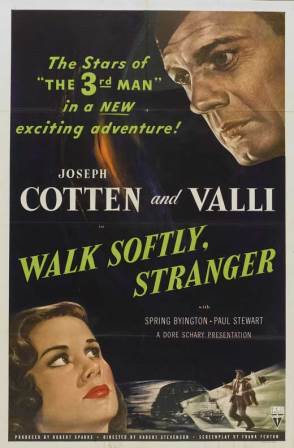His dark past rolled in like a black fog.
Usually when Howard Hughes held onto a film and didn’t release it, it was a sign of dire trouble of a really poor product; note John Wayne’s Jet Pilot, which Hughes’ tinkered with so often that the jets featured in it were actually almost obsolete by the time the film was released.
Such wasn’t the case with 1950’s Walk Softly, Stranger which was filmed in 1948 but released in 1950, most likely to capitalize on the success of the stars in 1949’s The Thin Man. Here Joseph Cotten is Chris Hale, a chronic gambler trying to create a new life. Alida Valli is Elaine Corelli, the handicapped daughter of the town’s local business mogul.
Chris has come to Ashton, Ohio trying to rebuild his life. He quickly meets Mrs. Brentman (Spring Byington) who owns a house that Chris claims to have grown up in. (While the film never states this is fiction, as one gets to know Chris you sense most of his backstory is something he made up just to fit in.) She agrees to rent him his old room and he quickly finds work at the local Corelli shoe factory.
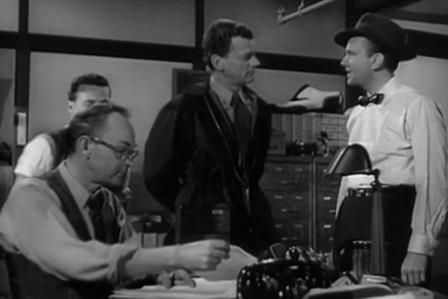 One night after work, Chris wanders into the local club and meets Elaine. He flirts with her, knowing she’s the daughter of money, and claims that he used to deliver newspapers to her home as a boy and always admired her from afar. After he leaves she’s so taken with him that she asks her father to get him a better job at the factory in sales.
One night after work, Chris wanders into the local club and meets Elaine. He flirts with her, knowing she’s the daughter of money, and claims that he used to deliver newspapers to her home as a boy and always admired her from afar. After he leaves she’s so taken with him that she asks her father to get him a better job at the factory in sales.
Though Chris ultimately declines the job in sales and keeps the lower one he already has, the few scenes at work do include short bits of Jack Paar in a rare film role. He gets a few quick quips in but otherwise is a flash in the pan.
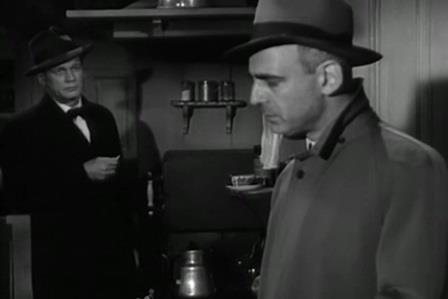 As the plot moves on we learn that Chris (whose real name may or may not be Steve) is actually a cardshark whose coming to the end of his run as most of the bigger gaming areas are aware of him and keep him out. As much as he wants to leave the rackets, he gets on a plane to meet his old accomplice Whitey (Paul Stewart). They proceed to rob gaming house owner Bowen (Howard Petrie) of $100,000, splitting the proceeds between themselves.
As the plot moves on we learn that Chris (whose real name may or may not be Steve) is actually a cardshark whose coming to the end of his run as most of the bigger gaming areas are aware of him and keep him out. As much as he wants to leave the rackets, he gets on a plane to meet his old accomplice Whitey (Paul Stewart). They proceed to rob gaming house owner Bowen (Howard Petrie) of $100,000, splitting the proceeds between themselves.
They agree to part ways and build new lives for themselves, knowing that though the crime will never be reported, that they will be marked men for the rest of their lives. Things go along just fine for a while until Whitey shows up, down on his luck and out of money.
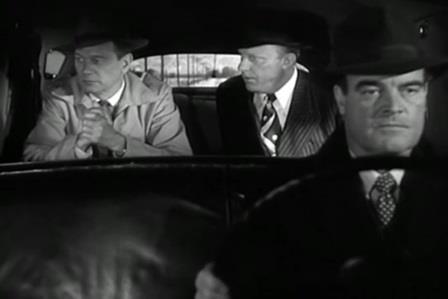 Chris tries to give Whitey his share of the take- all of which he still has. In the back of his mind, however, he figures that Whitey’s been tailed and that their covers are blown. Soon he confirms this is the case and begins seeing dark sedans lingering behind him. Ultimately he’s cornered by Bowen and a few of his goons.
Chris tries to give Whitey his share of the take- all of which he still has. In the back of his mind, however, he figures that Whitey’s been tailed and that their covers are blown. Soon he confirms this is the case and begins seeing dark sedans lingering behind him. Ultimately he’s cornered by Bowen and a few of his goons.
Chris tries to elude them, even going so far as paying for Mrs. Brentman to take a trip and taking her to the airport. At the end, though, he realizes there is no escape and allows himself to be driven off with Bowen’s crew in their car. He creates a struggle in the car, causing a horrific crash. This frees him from Bowen’s retribution but exposes his crime to the police.
In a rather saccharin fueled ending, Chris heads off to prison as Elaine promises to wait for him.
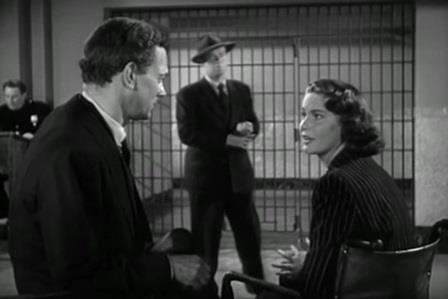 Though some have criticized Walk Softly, Stranger for being a bit slow and even lacking in action, only the latter is true. What most reviewers miss is that the real story of the film isn’t really Chris and Whitey’s theft and escape from Bowen, but rather Chris’ tough fight battling his gambling addiction. First he leaves the games, but can’t resist one final score; bigger and riskier than all the rest combined. Even cornered he can’t resist making an innocent type of gamble with the neighbor boy who skates along the sidewalk, offering him a dollar a minute to sit on his stoop (assuming the goons won’t attack a child).
Though some have criticized Walk Softly, Stranger for being a bit slow and even lacking in action, only the latter is true. What most reviewers miss is that the real story of the film isn’t really Chris and Whitey’s theft and escape from Bowen, but rather Chris’ tough fight battling his gambling addiction. First he leaves the games, but can’t resist one final score; bigger and riskier than all the rest combined. Even cornered he can’t resist making an innocent type of gamble with the neighbor boy who skates along the sidewalk, offering him a dollar a minute to sit on his stoop (assuming the goons won’t attack a child).
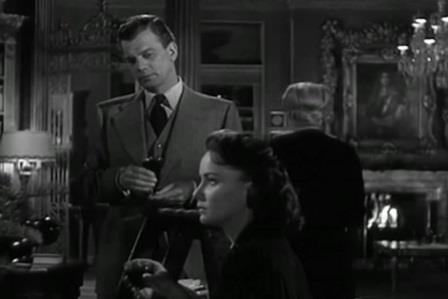 Joseph Cotten, a quiet favorite, seems well suited to this role. Much more so than Cary Grant, who supposedly was first considered for the role (though with Alfred Hitchcock potentially as director, which of course alters all potential comparisons). Cotten’s demeanor, though undemonstrative, is clearly calculated as we can almost literally feel him figuring out his next two or three moves. Presumably exactly what a career criminal would be doing.
Joseph Cotten, a quiet favorite, seems well suited to this role. Much more so than Cary Grant, who supposedly was first considered for the role (though with Alfred Hitchcock potentially as director, which of course alters all potential comparisons). Cotten’s demeanor, though undemonstrative, is clearly calculated as we can almost literally feel him figuring out his next two or three moves. Presumably exactly what a career criminal would be doing.
Alida Valli plays well as his romantic interest, though my impression is that at least initially Chris’ interest in her was purely self-serving to get close to her father. Their scenes together show some chemistry (probably not the easiest thing to do against Cotten), but also highlight perhaps why Ms. Valli’s career rather petered out after some initial successes. Though nice to look at she struggles to emote and even in the finale scene as Chris heads to prison.
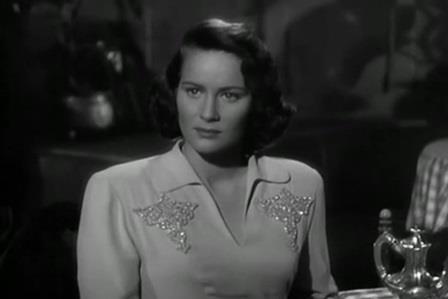 Speaking of that last scene, take a moment to look at how Cotten manhandles and paws at Valli’s hair as she tells him she’ll always be his. You’d think there’d be some tenderness there, but there isn’t any inkling of this. Then it looks like he almost rips the poor woman’s ear off as his last gesture before starting his time.
Speaking of that last scene, take a moment to look at how Cotten manhandles and paws at Valli’s hair as she tells him she’ll always be his. You’d think there’d be some tenderness there, but there isn’t any inkling of this. Then it looks like he almost rips the poor woman’s ear off as his last gesture before starting his time.
Walk Softly, Stranger works, and the tension builds effectively up to the final climactic chase and ultimate wreck. Is it, a great movie? No, undoubtedly not. But it’s effective in all areas from casting to performances to plot and production values. For looking at the latter, check out the scenes at Valli’s home, especially the Christmas scenes. Though a financial bust for RKO, it perhaps shouldn’t get the somewhat harsh criticism it’s been subjected to.
